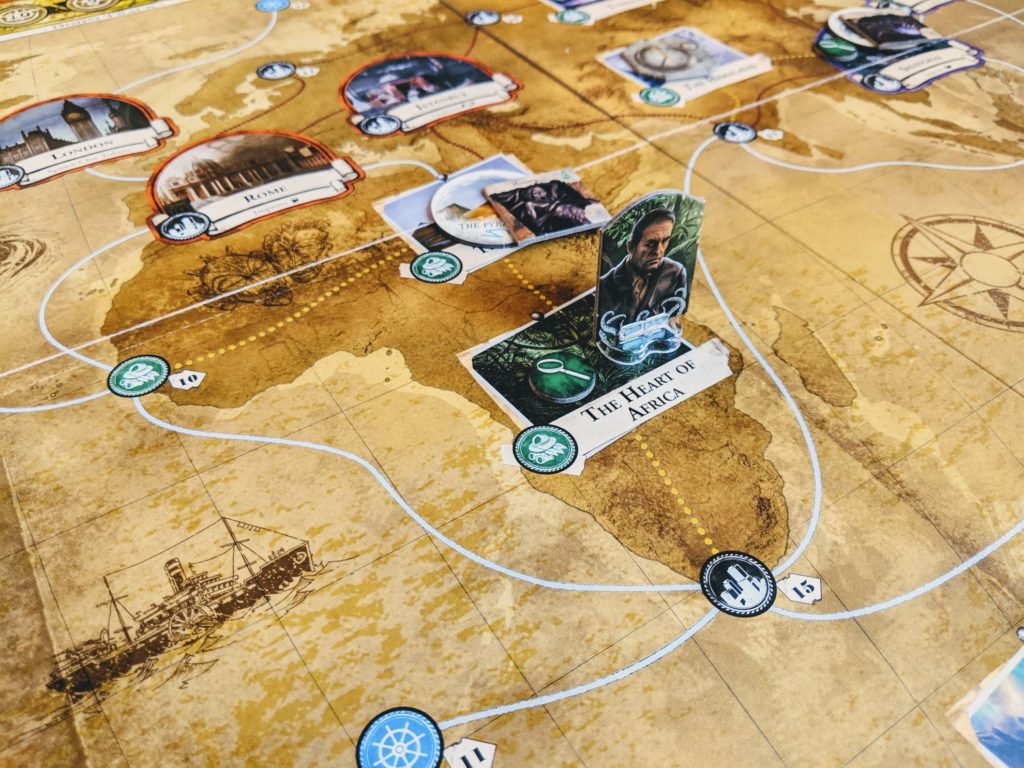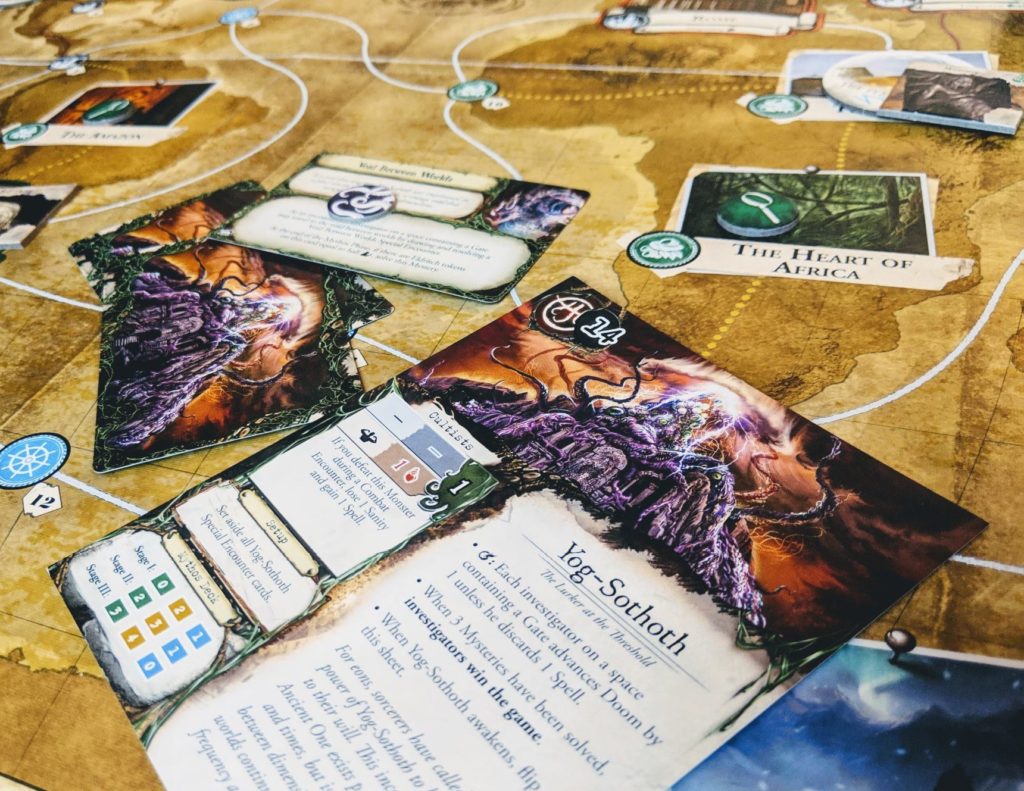“I can go and try to close that gate before Tokyo gets overrun but I would also like to get blessed in Rome.”
“What if there is a reckoning and that Hound of Tindalos attacks you? We should close the gate. The omen will match the gate in the next turn and the doom will also advance.”
“But closing the gate is also not certain. Also, I can’t even get there, I don’t have any ship tickets left.”
“I’ll go to Tokyo then, you should do the expedition so we can solve this mystery.”
“I’ll have to get some clue tokens before that. I also need to rest to try to get rid of my Paranoia, Amnesia, Internal Injury, and Leg Injury. ”
Eldritch Horror is a massive game by Fantasy Flight Games, set in a Lovecraft’s world of elder gods and unspeakable horrors where desperate and often insane investigators try to stop the rise aforementioned deities. Put on some old-timey music, dim the lights (not too much, you will have to read loads of tiny cards), and prepare for a four-hour adventure through ancient wilderness, cities of the world, and untamed seas.
The gameplay is very involved, and will probably take about ninety minutes to explain to someone new, so I will only provide a short rundown. The goal of the game is to stop the rise of an Ancient One (the game has several gods to choose from) by solving mysteries. The group of investigators need to handle some number those before the doom advances to zero or all of them die/go insane. Players will have to move around the world, do encounters in different cities, train themselves, acquire assets, fight monster, find clues and close gateways to other worlds. Most actions will require dice rolls, to pass a test the player needs to roll at least one success, by default that means a five or a six. Therefore there is definitely an element of luck in the game, but using items, tomes, spells and training the investigators can theoretically make things easier. During the Mythos phase random, usually awful, things will happen to them, like monsters spawn, gates open, the lead investigator gets devoured. Once everyone had their turn and the mythos phase ends, the next round begins.

This game is long, up to five hours, depending on the decisiveness of the group. It is also pretty big, you will need a fairly big dining room table to fit all the decks, tokens, and the sizeable game board. The base game by itself should be okay but once you get some expansions fitting everything on one table will be a challenge. You might even invest in some organizers, or build your own, to keep track of all the components. The difficulty of the game can be customized using the Mythos deck, which controls the random events of the game: for an easier game add the frosty cards, for a more challenging experience, add the ones with tentacles on them.
The Good
The theme of the game works very well. The playthrough is usually difficult, the investigators will struggle to achieve their goals, they will go insane occasionally, and the threat of the ancient one will loom over the whole experience. The game has a lot of cards, investigators and ancient ones, which will make all the playthroughs unique at the beginning, and once the base set has been exhausted, Eldritch Horror has a ton of expansions, with new gods, playable characters, boards, locations, and some new mechanics.
The highlights of the game are the theme, the replayability, and the struggle/challenge of the gameplay. Eldritch horror has this great mechanic where each card has a front that you can read when you acquire it, and a back which is unknown until something specific happens. This adds a great deal of excitement to the gameplay, for example, you have an awesome spell with which you can bless your teammate so that their fours also count as a success. You test your lore, roll with four dice, get one success. Now you get to flip your card and see what that means: you could lose a sanity, or a health, maybe lost the card itself, who knows until the spell was cast. This is just one example, there are loads of items that work like this (locked boxes that you can flip once you managed to open them, ancient tomes you can read once you translated them), and also conditions. The conditions make up a huge chunk of the Eldritch experience, and are one of the most memorable parts of the game. Usually if you fail test there are some repercussions, you break a leg or get amnesia. These conditions will sit in front of you and if you cannot get rid of them in time, when the reckoning comes during the Mythos phase you get the flip the card and stare in horror at the consequences. After a couple of gameplays you will start to fear some of these and be suspicious of each card, wondering what is the price of taking on some debt or agreeing to a Hallucinations condition for a clue token.

The Bad
The dice rolling and random events sometimes hijack the game and you end up spending hours on barely trying to survive amongst all the misfortunes just to be eaten in the end by a Gug and failing against Yog-Sothoth. The game is too long for this type of desperation to work, so some people won’t like such randomness. Some might say and wouldn’t be wrong that Eldritch Horror feels like a game where you just flop around helplessly while bad things happen to you. On the other hand, some will like the simpleness of the dice rolling.
Another big issue with the game is the number of expansions. As of and of 2018 Eldritch Horror has four big and four small expansions, that make and already huge game humongous. The sheer amount of cards is daunting, sorting through all that for each playthrough, picking boards, adventure, preludes. It is also very harrowing for completionists.
I left the biggest problem for last: the end of the game is not satisfying. The investigators need to solve x number of mysteries, and once you do that the game ends. It just ends, there is no final push, no gratifying endgame, you have been doing the same thing for four hours now, and the reward is that you can finally stop. This really breaks my heart because I absolutely love this game, and it is one of my favourites, but the ending is just bad. Or maybe I should say the lack of a proper ending. Once you are done you sit around the table and produce a half-enthusiastic “yaay” and go on with packing everything up. It would have been so easy to write some additional story elements for each ancient one. Just one paragraph saying and the armies Yog-Sothoth dispersed because the cultists’ plot has been revealed and their efforts subverted.

The Co-Op
As a co-operative game Eldritch Horror fares very well. You need to strategize together, decide when to go for items and training and when to go for mysteries and gates. There is a balance in the game, you need to have good gear to successfully tackle the enemies, but you are also running out of time, so you can’t spend all your efforts on trying to get the best gun. As a team you will have to decide which characters will go and risk their lives against monsters and which characters will work on training and assembling gear. For two players we recommend each of you to handle two investigators, we found that works better than playing with only two characters in total.
However, in some cases someone might be left behind due some unlucky rolls. For example, it is possible to get detained or get lost in time and space, and unless you manage to roll that six you won’t be able to do anything in the game.
The Recommendation
Overall this is a great co-operative game with high replay value, if you are into extremely long and complicated games, and if you love Lovecraft.
Info
| Release Year | 2013 |
| Genre | Strategy |
| Difficulty | Hard |
| Number of Players | 1 to 8 |
| Length | 2 - 5 hours |
Rating
| Overall | Great |
| Story | Great |
| Co-Operation | Good |